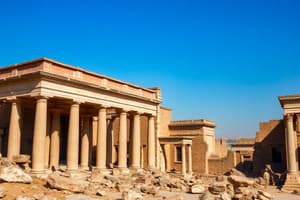Podcast
Questions and Answers
What was the significance of the Battle of Adrianople (378 AD) in the decline of the Roman Empire?
What was the significance of the Battle of Adrianople (378 AD) in the decline of the Roman Empire?
- It established the dominance of the Eastern Roman Empire over the Western Roman Empire.
- It led to the death of Emperor Valens and demonstrated the growing threat of the Goths. (correct)
- It marked a decisive Roman victory over the Huns.
- It was the first battle to use catapults on a large scale.
Diocletian is known for splitting the Roman Empire into Eastern and Western halves.
Diocletian is known for splitting the Roman Empire into Eastern and Western halves.
True (A)
What was the main effect of the Edict of Milan (313 AD) on the Roman Empire?
What was the main effect of the Edict of Milan (313 AD) on the Roman Empire?
It legalized Christianity and led to its rise within the Roman world.
The last emperor of the Western Roman Empire was __________.
The last emperor of the Western Roman Empire was __________.
Which of the following was NOT a reason for the economic decline of the Roman Empire?
Which of the following was NOT a reason for the economic decline of the Roman Empire?
The sack of Rome by the Visigoths in 410 AD was the first time Rome had been sacked in nearly 800 years.
The sack of Rome by the Visigoths in 410 AD was the first time Rome had been sacked in nearly 800 years.
Which group was NOT involved in the invasions that led to the fall of the Roman Empire?
Which group was NOT involved in the invasions that led to the fall of the Roman Empire?
Match the following events with their significance:
Match the following events with their significance:
How did the spread of Christianity affect the Roman Empire in its later stages?
How did the spread of Christianity affect the Roman Empire in its later stages?
Constantine the Great moved the capital of the Roman Empire from Rome to Byzantium.
Constantine the Great moved the capital of the Roman Empire from Rome to Byzantium.
What was the role of mercenaries in the fall of the Roman Empire?
What was the role of mercenaries in the fall of the Roman Empire?
Which barbarian leader famously sacked Rome in 455 AD?
Which barbarian leader famously sacked Rome in 455 AD?
The Huns' invasion pushed other barbarian groups into ______ territory.
The Huns' invasion pushed other barbarian groups into ______ territory.
What effect did the Roman military’s reliance on non-Roman mercenaries have on the empire?
What effect did the Roman military’s reliance on non-Roman mercenaries have on the empire?
Which event is often considered the official end of the Western Roman Empire?
Which event is often considered the official end of the Western Roman Empire?
Why did the Eastern Roman Empire (Byzantine Empire) survive longer than the Western Roman Empire?
Why did the Eastern Roman Empire (Byzantine Empire) survive longer than the Western Roman Empire?
Flashcards are hidden until you start studying
Study Notes
The Fall of the Roman Empire
-
Battle of Adrianople (378 AD): A decisive defeat for the Romans against the Goths, resulting in the death of Emperor Valens and highlighting the vulnerability of the empire to barbarian forces.
-
Division of the Roman Empire: Emperor Diocletian divided the empire into Eastern and Western halves (285 AD) to make it more manageable and secure.
-
Edict of Milan (313 AD): Legalized Christianity within the Roman Empire, marking a turning point in its cultural landscape and paving the way for its eventual dominance.
-
The "Barbarian Invasions": A series of incursions by various barbarian groups, including the Visigoths, Vandals, and Franks, played a significant role in the empire's decline.
-
Sack of Rome (410 AD): Led by Alaric I and his Visigoths, the sacking of Rome shattered the empire's sense of invincibility, marking a symbolic blow to its power and prestige.
-
Romulus Augustulus (476 AD): Considered the last emperor of the Western Roman Empire, he was deposed by Odoacer, a Germanic king, signaling the end of Western Roman rule.
-
Economic Decline: Heavy taxation, reliance on slave labor hindering innovation, frequent invasions disrupting trade, and inflation contributed to the empire's weakening economy.
-
Influence of Christianity: The spread of Christianity weakened traditional Roman values and loyalties, contributing to societal fragmentation and a shift in political power dynamics.
-
Constantine the Great: Moved the Roman capital from Rome to Byzantium (later renamed Constantinople).
-
Mercenaries: The reliance on non-Roman mercenaries created a lack of loyalty within the Roman military and contributed to internal instability.
-
Attila the Hun: Famous barbarian leader who led the Huns in their raids, pushing other barbarian groups into Roman territory.
-
Effect of Non-Roman Mercenaries: Created internal divisions, weakened loyalty to the government, and contributed to the empire's decline.
-
Deposition of Romulus Augustulus (476 AD): Generally considered the official end of the Western Roman Empire.
-
Eastern Roman Empire’s (Byzantine Empire’s) survival: Attributed to its advantageous geographical location, stronger economy, and adaptability in response to challenges.
Studying That Suits You
Use AI to generate personalized quizzes and flashcards to suit your learning preferences.




